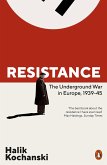'Powerful . . . there is rage in his ink. McKay's book grips by its passion and originality. Some 25,000 people perished in the firestorm that raged through the city. I have never seen it better described' Max Hastings, Sunday Times
In February 1945 the Allies obliterated Dresden, the 'Florence of the Elbe'. Explosive bombs weighing over 1,000 lbs fell every seven and a half seconds and an estimated 25,000 people were killed. Was Dresden a legitimate military target or was the bombing a last act of atavistic mass murder in a war already won?
From the history of the city to the attack itself, conveyed in a minute-by-minute account from the first of the flares to the flames reaching almost a mile high - the wind so searingly hot that the lungs of those in its path were instantly scorched - through the eerie period of reconstruction, bestselling author Sinclair McKay creates a vast canvas and brings it alive with touching human detail.
Along the way we encounter, among many others across the city, a Jewish woman who thought the English bombs had been sent from heaven, novelist Kurt Vonnegut who wrote that the smouldering landscape was like walking on the surface of the moon, and 15-year-old Winfried Bielss, who, having spent the evening ushering refugees, wanted to get home to his stamp collection. He was not to know that there was not enough time.
Impeccably researched and deeply moving, McKay uses never-before-seen sources to relate the untold stories of civilians and vividly conveys the texture of contemporary life. Dresden is invoked as a byword for the illimitable cruelties of war, but with the distance of time, it is now possible to approach this subject with a much clearer gaze, and with a keener interest in the sorts of lives that ordinary people lived and lost, or tried to rebuild.
Writing with warmth and colour about morality in war, the instinct for survival, the gravity of mass destruction and the manipulation of memory, this is a master historian at work.
'Churchill said that if bombing cities was justified, it was always repugnant. Sinclair McKay has written a shrewd, humane and balanced account of this most controversial target of the Anglo-American strategic bombing campaign, the ferocious consequence of the scourge of Nazism' Allan Mallinson, author of Fight to the Finish
'Beautifully-crafted, elegiac, compelling - Dresden delivers with a dark intensity and incisive compassion rarely equalled. Authentic and authoritative, a masterpiece of its genre' Damien Lewis, author of Zero Six Bravo
'Compelling . . . Sinclair McKay brings a dark subject vividly to life' Keith Lowe, author of Savage Continent
'This is a brilliantly clear, and fair, account of one of the most notorious and destructive raids in the history aerial warfare. From planning to execution, the story is told by crucial participants - and the victims who suffered so cruelly on the ground from the attack itself and its aftermath' Robert Fox, author of We Were There
Dieser Download kann aus rechtlichen Gründen nur mit Rechnungsadresse in A, B, BG, CY, CZ, D, DK, EW, E, FIN, F, GR, HR, H, IRL, I, LT, L, LR, M, NL, PL, P, R, S, SLO, SK ausgeliefert werden.









